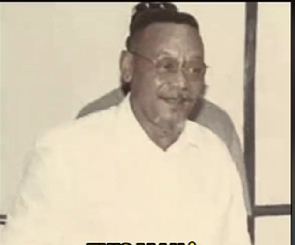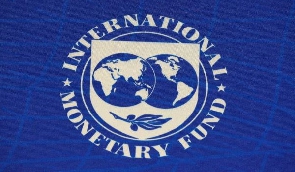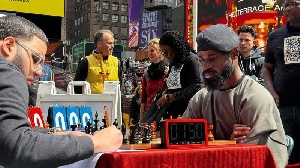Opinions of Thursday, 24 April 2003
Columnist: Asare, Kwaku S.
Do we Have a FIT System to Resolve our Election Disputes?
Election disputes are inevitable by-products of elections and are commonplace, even in the more matured democracies (e.g., the recent Bush vs. Gore dispute as to who won the state of Florida and, hence, the USA Presidency). These disputes have been resolved successfully, using well established mechanisms (as in the Bush vs. Gore dispute, which was settled by the USA Supreme Court), or have degenerated into chaos and conflict (as in the 1992 Angola elections or the 1996 elections in Bosnia and Herzegovina). Because election disputes are inevitable and can produce varying, sometimes catastrophic, outcomes, it is important for all democracies to emplace a credible and viable Electoral Dispute Resolution System (i.e., EDRS) to minimize the likelihood that the disputes will escalate into conflict and maximize the potential for the disputes to be resolved in a Fair, Impartial and Timely (i.e., FIT) fashion.
Predictably, the 4th Republic has witnessed various election disputes. For instance, the NPP boycotted the 1992 Parliamentary elections, on grounds that the outcome of the preceding Presidential elections, won by Chairman Jerry Rawlings, had been rigged. In the 1996 elections, there was a dispute as to whether Rebecca Adotey, who had been prematurely declared the winner, or George Amoo, who actually had more votes, should represent the Ayawaso-West Constituency. Even though the Electoral Commissioner (EC) subsequently corrected the tally and a trial court affirmed that Amoo had won, the case got stuck in the appellate process and was never resolved for him to take his rightful place in parliament. In the 2000 elections, the EDRS took over 26 months to resolve the Wulensi dispute but very few people were satisfied with either the process or the outcome. All the 3 general elections, including intervening bye-elections, have been followed by allegations of abuse of incumbency, intimidation by macho-men and abuse of various campaign laws. Yet, very few, if any, of these allegations have been investigated and nobody, to my knowledge or recollection, has ever been prosecuted for violating any election laws.
I view these incidents and outcomes as a stunning indictment of the EDRS, which is supposed to stand between democracy and anarchy. Further, I am convinced that unless we reform the EDRS, we will be plunged into an avoidable conflict in the near future. Following this conviction, my objective is to identify 5 problems that contribute to our ineffective EDRS and offer 5 simple steps to curb these ailments. I repair to the problems as:
- (i) Chronological Blindness;
- (ii) Statutory Blindness;
- (iii) Jurisdictional Blindness;
- (iv) Deadline Blindness; and
- (v) Enforcement Blindness.
CHRONOLOGICAL BLINDNESS: The current EDRS, which encourages citizens to challenge the qualifications of duly elected candidates, as happened in Wulensi, is dysfunctional. This system, in effect, invites defeated parties to ?appeal? the decision of voters and empowers judges to set aside the wishes of the voters. In my opinion, such a system, which led to the disqualification of honorable Samuel Nyimakan in 2003, is not only a recipe for abuse and mischief but also constitutes an imminent threat to our young democracy. The most fundamental principle of democracy is that it is the people who decide who should represent them. As a result, the wishes of the people, as expressed by their votes, should be respected and set aside rather sparingly.
The preferred timing for challenging the qualification of candidates must be before the elections, as happened in the Ekwam vs. Pianim (no. 2) case (1996 SCGLR), where Ekwam challenged the qualifications of Pianim to contest for Presidency, even before the NPP congress. In Ekwam vs Pianim (no. 1), Justice Kpegah, in restraining the NPP from holding its congress, pending the resolution of Pianim?s qualification, indicated that ?the political fallout, from the court disqualifying a duly elected Pianim, would be incalculable, as the party will have to organize another congress. In other words, it is far better to resolve all questions on qualifications before the elections are held.
Alas, this common sense route to disqualifying ?unqualified aspiring MPs? may not be available because of the Supreme Court?s (SC) ruling in Yeboah v. J. H. Mensah (1999 SCGLR). In that case, the plaintiff went to the SC, under article 2, for a declaration, inter alia, that under article 94 (1b), the defendant was not qualified to be an MP. The SC ruled that the plaintiff?s action was in substance and reality, an election petition, determinable only by the high court under article 99, which addresses issues of whether a candidate has been validly elected as an MP. But how can that be if section 18 (1) of PNDCL 284 provides that ?an election petition shall be presented within 21 days after the date of the publication in the Gazette of the result of the election to which it relates? and subsection (2) says ?the presentation of an election petition under subsection (1) shall not be valid unless within the time specified in subsection (1)??
Put differently, the SC?s decision suggests that Yeboah must wait for the elections to be decided before he can contest the qualifications of J. H Mensah, contrary to the sage advice of Kpegah, in Ekwam v. Pianim. Either Yeboah v. Mensah does not fall under article 99, contrary to the SC ruling, or if it does, it evidences an unimaginable preference for waste and the incalculable political fallout, envisaged by Justice Kpegah.
Fortunately, I can see no reason why the bizarre result, from Yeboah, follows from the constitution. Nor, do I see any merit in the SC?s stance. It seems to me that the difficulty in the Yeboah case, as continued in the Nyimakan case, can be avoided by recognizing that election disputes can occur at various times, including, before the election. Unless we cure this chronological blindness, our EDRS will not be capable of delivering FIT outcomes.
STATUTORY BLINDNESS: Considerable confusion exists in the extant laws on elections and this reduces the likelihood that the EDRS can produce FIT outcomes. Even after almost 3 years of litigation in the Wulensi affair, I have significant doubts as to whether we are anywhere close to fathoming the provisions of article 94 (b) of the constitution. As I have opined elsewhere (see http://www.ghanaweb.com/GhanaHomePage/features/artikel.php?ID=31956), the phrase ?hail from a constituency? does not admit to an easy interpretation and the Wulensi outcome will only open the floodgate to endless and mindless litigation.
Similarly, while article 42 grants every citizen, who is 18 years or above, unfettered access to the ballot box, section 7 (4) of PNDCL 284 circumvents this right, by precluding the registration of Ghanaians who have been away from their places of residence in Ghana for a continuous period of six months. In spite of Tehn-Addy v. Electoral Commissioner (1997 SCGLR), where Justice Acquah held that the exercise of the voting right cannot be denied in the absence of a constitutional provision to that effect, the EC, sadly, continues to enforce section 7 (4) of PNDCL 284 , to the detriment of many Ghanaians. The denial of the right to vote is not only unconstitutional and inherently perverse but carries with it many derivative liabilities, including being disqualified from holding a number of public positions (see article 94 (1a), article 78 (1), article 44 (1), article 62 (c), article 194 (3a), article 232 (3)).
As another example, article 47 (1) grants the EC the power to divide the country into constituencies, subject to a floor of 140 and no ceiling. Since the EC lacks the power of the purse, this mandate, which is essentially unfunded, can only create unnecessary conflict. The article leaves us in the dark as to the process that must be followed and who has the real, in contrast to the paper, authority to increase or, more controversially, to decrease the number of constituencies? By way of contrast, article 20 (2) of the 1957 constitution eliminated such a conflict situation by specifying that ?The national assembly shall consist of a speaker and not less than 104 members to be known as MPs; but the number of MPs may be increased from time to time by the creation of further electoral districts under the provisions of section 33, 70, and 71, but in any event the total number of MPs shall not exceed 130." In turn, sections 70 and 71 specified the exact process and authority (i.e., a General Electoral Delimitation Commission appointed by the Governor-General, Gazette requirements, Public Hearings, etc).
Other aspects of the election laws that represent potential trouble spots include the demarcation of existing electoral boundaries (e.g., are all votes weighed the same? see article 47 (3)); election of a President (e.g., should a runoff be held when a candidate has won 3 million out of 6 million valid votes cast? see article 63 (3)); how to handle the transition from one government to another; etc. These examples are not meant to be comprehensive but just to illustrate that incoherent, inchoate and confusing laws present significant headaches for those responsible for resolving election disputes.
JURISDICTIONAL BLINDNESS: Jurisdiction refers to the forum, to which an aggrieved citizen must turn, to seek redress for a perceived electoral violation. For instance, should the citizen seek a remedy from the EC or the high court, what appellate process must be followed and which authority has the final decision? It seems that many stakeholders, especially the SC, are afflicted with jurisdictional blindness. For instance, on January 16, 2001, the SC found the jurisdiction to overrule a Bolgatanga High Court Justice?s order for a recount of the votes in the Bawku Central constituency (see Ex Parte Hawa Yakubu CM No. 2/2001). At issue in that dispute was whether honorable Hawa Yakubu had been validly elected as an MP (an article 99 question). Then on January 16, 2003, the same SC ruled that it lacked the jurisdiction to hear the Wulensi election petition because of the latin maxim, ?generalia specialibus non deoragant,? which literally means ?general things do not derogate from special things (for details see http://www.ghanaweb.com/GhanaHomePage/features/artikel.php?ID=32404).
Either the SC is wrong in Ex Parte Hawa Yakubu or it is wrong in the Wulensi case. Others who have been blinded by jurisdiction include the plaintiff in Yeboah v. Mensah, where the court ruled that the High Court, not the SC, was the proper forum for determining the plaintiff?s petition. It seems to me that the citizens cannot have any confidence in an ERDS that seem to generate such conflicting answers, on questions as fundamental as jurisdiction.
DEADLINE BLINDNESS: Deadlines are time limits imposed on the ERDS to initiate and settle disputes. Perhaps, the only deadline known to our ERDS is section 18 (1) of PNDCL 284, which requires that all ?election petitions? be initiated within 21 days after the date of publishing the elections results in the Gazette. Once a petition is filed, however, there appears to be no deadlines on when the matter must be resolved. This, regrettably, explains why the Wulensi dispute took 27 months to resolve, slightly better than the Ayawaso-West dispute, which was not even resolved before the expiration of the right in question. Given that election outcomes convey a right to represent voters for a fixed period this deadline blindness represents an unacceptable state of affairs, which requires immediate attention and fixing.
ENFORCEMENT BLINDNESS: This refers to the flagrant disregard and violation of unambiguous elections laws. Examples of this are easy to find. For instance, even though article 47 (3) requires that all votes be weighed equally (i.e., the boundaries of each constituency shall be such that the number of inhabitants in the constituency is, as nearly as possible, equal to the population quota), there is abundant and systematic evidence that votes are differentially weighed in the parliamentary elections. Another area of glaring abuse is the Political Party Financing Laws. For instance, even though article 55 (14) requires Political Parties to publish annual audited statements, I am yet to see any such statements. As a result, it is hard to know whether the Political Parties comply with article 55 (15), which requires that only a citizen of Ghana may contribute or donate to a Political Party. Other examples include violations of the equal air time (article 55 (11)), wanton disregard for the law on internal democracy (article 55 (5)), and the high entry cost that the political parties impose on aspiring candidates (for instance, some of the parties require Presidential candidates to pay a fee of 100 million cedis). Little wonder that there continues to be accusations and counteraccusations of abuse of incumbency, electoral irregularities and financial malpractices. Enforcement blindness has, at least, four effects on the body politic. First, it reduces the confidence that citizens have in the EDRS. Second, it has a contagious effect in that it empowers violators to find new laws to violate and attracts prior non-violators to join the violations. Third, this state of lawlessness frustrates law abiding citizens. Fourth, and more significantly, it increases the likelihood that citizens will use other avenues, probably more violent avenues, to resolve future disputes. In this vein, enforcement blindness can be likened to hypertension or the ?slow killer.?
I, now, turn my attention to how we can cure each of the blindness and, in the process, reform and strengthen the EDRS.
CHRONOLOGICAL REMEDIATION: The EDRS should classify election disputes to reflect the chronological phases of the elections. As an illustration, I have delineated 4 phases in Table 1. Pre-election disputes are those that arise before the voting day. Examples include disputes on whether a citizen has the right to be registered (e.g., Tehn Addy v. Electoral Commissioner), accuracy of the voters? register; qualification of candidates, etc. Election-day disputes arise on the date of the election. Examples include names that are missing from the register, polls that do not open for the specified duration (e.g., closing too early or opening too late), intimidation of voters, double voting, etc. Post-voting disputes include counting disagreements (e.g., has a vote been validly cast), security of ballot boxes, tallying absentee ballots, tallying votes, etc. Finally, virtual disputes are those that can arise anytime during the election cycle. They include abuse of incumbency, campaign finance issues, access to state owned media, etc.
Decomposing the disputes this way highlights that election disputes come in many colors and flavors, some bordering on mechanics (e.g., vote counting and tallying, etc.) and some bordering on constitutional interpretation. This will dismiss all the absurdities that are beginning to characterize our election disputes. For instance, under this decomposition regime, Yeboah and Nyimakan will properly be considered as qualification or pre-election issues, which can fall under article 140 or even article 2 (the constitutional questions). In contrast, Amoo will be considered as a post-election issue, to be decided under article 99, with its 21-day limitation period. Practically, this approach will disentangle the question of whether one is qualified to be a candidate from that of whether one has been duly elected.
STATUTORY REMEDIATION: It is important that the EDRS is governed by a coherent body of laws, which are readily accessible to the citizens, preferably in a pamphlet and the internet. The language used must be unambiguous to avoid conflicting interpretation. To this end, an appropriate authority must be set up to review, streamline and clarify regulations, statutes, case law and articles in each of the chronological phases to ensure uniform interpretation and application of the relevant laws. These laws or their citations can be included in the second column of Table 2.
JURISDICTIONAL REMEDIATION: For each dispute, identified in the chronological phases, the law should be very clear on the hierarchical appellate procedure to be followed for its resolution. That is, original jurisdiction must be clearly specified, followed by a stipulation of the appeal procedures. The law should also clearly state which authority has final and binding jurisdiction. Under the reformed ERDS, disqualifying elected candidates should be rare. However, in the event that it should come to that, the full panel of the SC must have final jurisdiction.
DEADLINE REMEDIATION: Considering that ?representation rights? have a short and fixed useful life, a viable EDRS must be divorced from the civil dispute resolution system, which is pregnant with endless and needless delays. To this end, the election laws must set deadlines for both the initiation and resolution of disputes. A key suggested change is to set a deadline, before the elections, after which the validity of a candidate may no longer be challenged. This will essentially do away with the Wulensi type of disputes. Under this regime of deadlines, the participants in the EDRS will be required to not only adjudicate electoral disputes but also to do so in a timely manner. This means that participants must plan for and emplace the logistics to meet these deadlines or be held accountable. Without such accountability, the EDRS will fail our democracy! The usual excuses for delays must be drowned in the sea of positive change.
ENFORCEMENT REMEDIATION: The only way to ensure enforcement is to create an enforcement wing of the EC. This wing should be given the power and resources to identify, investigate, sanction, and, where necessary prosecute, criminal violators of election laws. Sanctions must be specified in advance and there should be a high probability that violations will exact consequences. An ERDS, like any system, is as good as the people who comprise it. Thus, all those involved in the ERDS must be well-trained on election dispute rules and procedures. Effective enforcement also requires the cooperation and participation of the citizens. All citizens should be entitled to file complaints on electoral violations, especially regarding the accuracy of the voters? register. For this to happen, the procedures for launching citizens? complaints should be transparent, understandable, accessible (especially low cost) and citizens must have confidence that their grievances will be resolved in a timely fashion. The ERDS matrix, in Table 1, could be completed and disseminated to various stockholders and sold at a discount to the citizenry. The completed matrix will identify the various disputes in each phase, who can initiate dispute (standing) and in what forum (jurisdiction), as well as when the disputes must be initiated and resolved.
The strength of a country?s democracy can be measured by the extent to which her EDRS resolves disputes in a FIT manner. My purpose was to establish that our EDRS requires a ?tune-up? and to demonstrate a possible form for the tune-up. The cardinal elements of any tuned-up system must include establishing a specific authority to codify existing election laws, a regime of strict deadlines for both initiation and resolution of disputes, classifying disputes into a chronological space, and establishing an enforcement wing to enforce extant laws. I am under no illusion that a short paper, such as this one, can address all facets of EDRS. Nevertheless, my objectives would have been accomplished, if I convinced the reader that the EDRS is in need of urgent reform!
Table 1: Election Dispute Resolution Matrix
| Relevant Laws and Cases | Standing and PETITION Deadline | Original Jurisdiction and Resolution DEADLINE | AppelLate Jurisdiction and RESOLUTIONDeadline | Remedy or Sanctions | |
| Pre-Election Disputes | |||||
| Right to vote | |||||
| Accuracy of voters? register | |||||
| Qualification of MPs | |||||
| Election-day Disputes | |||||
| intimidation | |||||
| Double voting | |||||
| Poll closed too early/late | |||||
| Post-Voting Disputes | |||||
| Counting | |||||
| Absentee ballots | |||||
| Invalid votes | |||||
| Virtual Disputes | |||||
| Campaign financing | |||||
| Abuse of incumbency | |||||
| Access to media |

Views expressed by the author(s) do not necessarily reflect those of Ghanaweb.












